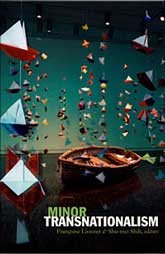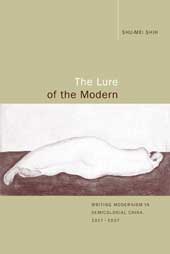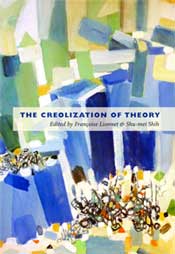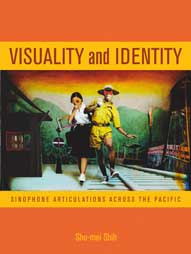




 |
 |
 |
 |
 |
HUM 597B Transnationalism, Visuality, and Identity: Professor Ted Mack How do bounded notions of national, ethnic, racial, and class identity function amid constant flows of capital, cultural products, and populations? What new formations have appeared within these transnational contexts? What new methodologies and concepts do these contexts demand of those engaged in the study of languages, literature, film, and history, to name only a few of the disciplines affected? This microseminar, organized to frame the visit of visiting Katz Lecturer Shu-mei Shih (Asian Languages & Cultures, Comparative Literature, and Asian American Studies, University of California Los Angeles), will explore these critical questions by examining her three most recent books—Minor Transnationalism (2005), Visuality and Identity (2007), and The Creolization of Theory (2011)—as well as her current work on “comparison as relation.” Students will gain familiarity with the vocabularies of transnational cultural studies, and deepen their analysis of historical and emergent cultural formations and the politics of identity. Successful completion of the course requires completing assigned readings, attending consistently, and actively participating in seminar discussions. Shu-mei Shih specializes in comparative Chinese, Sinophone, and Asian American literatures, with research emphases in transnational feminism, minority discourse, modernism, (post)humanism, and (post)colonialism. At University of California, Los Angeles, she co-directs the “Cultures in Transnational Perspective” Mellon Postdoctoral Fellowship Program in the Humanities, which promotes comparative studies of minority cultures in transnational contexts. Required Text: Shu-mei Shih, Visuality and Identity: Sinophone Articulations across the Pacific (Berkeley: University of California Press, 2007). Additional readings will be available to class members as PDF files, links to which are below. The following assignments and schedule are tentative and subject to change. |
DATE |
ASSIGNMENTS |
|
| Tuesday, October 30 | Theme: Minor Transnationalism Readings: Lionnet and Shih eds., Minor Transnationalism (Duke 2005), “Introduction: Thinking Through the Minor, Transnationally” and Shih, “Towards an Ethics of Transnational Encounters, or, ‘When’ does a ‘Chinese’ Woman become a ‘Feminist’?” |
|
| Tuesday, November 6 | Theme: Visuality in the Transnational Context Reading: Shih, Visuality and Identity: Sinophone Articulations across the Pacific (2007), “Introduction” and chapters 1, 2, and 6 |
|
| Wedneday, November 14 | Theme: “Racializing Area Studies, Defetishizing China” Reading: Shih, “The Concept of the Sinophone” (PMLA 126:3 [2011]) |
|
| Thursday, November 15 | [Katz Lecture] Tentative lecture title: “From World History to World Art: Reflections on New Geographies of Feminist Art in Asia” | |
| Tuesday, November 20 | Theme: Theorizing in the Transnational Context Readings: Shih and Lionnet, eds., The Creolization of Theory (Duke 2011), “Introduction: The Creolization of Theory,” and Balibar, “Towards a Diasporic Citizen? From Internationalism to Cosmopolitics.” Also, Shih, “Theory, Asia, and the Sinophone" (Postcolonial Studies 13:4 [2010]) |
| Johns Hopkins Guide to Literary Theory and Criticism
(Off-campus link) The online guide contains more than 240 alphabetically arranged entries on critics and theorists, critical schools and movements, and the critical and theoretical innovations of specific countries and historical periods. |
 |
EXPECTATIONS and GRADING PARTICIPATION: Participation in classroom discussions is central to successful performance in the class. GRADING: Students will be given a grade of either (C) Credit or (NC) No Credit for this one-credit class. ACADEMIC ACCOMMODATIONS: I will do everything I can to accommodate students with particular needs. To request such an accommodation, please contact Disabled Student Services, 448 Schmitz, (206) 543-8924 (V/TTY). If you have a letter from Disabled Student Services indicating that you require such accommodation, we can discuss ways to meet those needs. |
Page last updated on
October 3, 2012
Background courtesy of Squidfingers